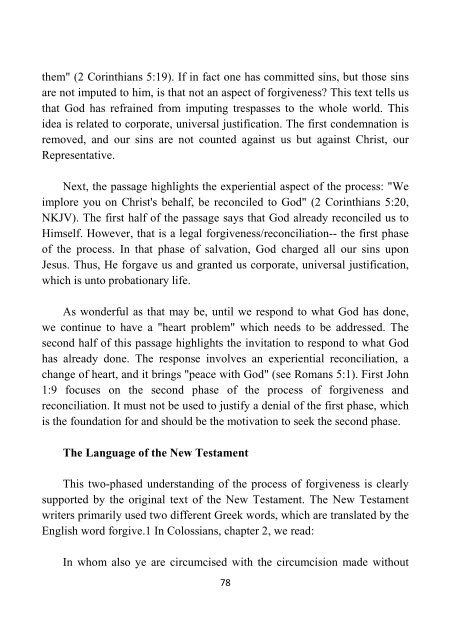Message of the Latter Rain - Kelvin M. Duncan
You also want an ePaper? Increase the reach of your titles
YUMPU automatically turns print PDFs into web optimized ePapers that Google loves.
<strong>the</strong>m" (2 Corinthians 5:19). If in fact one has committed sins, but those sins<br />
are not imputed to him, is that not an aspect <strong>of</strong> forgiveness? This text tells us<br />
that God has refrained from imputing trespasses to <strong>the</strong> whole world. This<br />
idea is related to corporate, universal justification. The first condemnation is<br />
removed, and our sins are not counted against us but against Christ, our<br />
Representative.<br />
Next, <strong>the</strong> passage highlights <strong>the</strong> experiential aspect <strong>of</strong> <strong>the</strong> process: "We<br />
implore you on Christ's behalf, be reconciled to God" (2 Corinthians 5:20,<br />
NKJV). The first half <strong>of</strong> <strong>the</strong> passage says that God already reconciled us to<br />
Himself. However, that is a legal forgiveness/reconciliation-- <strong>the</strong> first phase<br />
<strong>of</strong> <strong>the</strong> process. In that phase <strong>of</strong> salvation, God charged all our sins upon<br />
Jesus. Thus, He forgave us and granted us corporate, universal justification,<br />
which is unto probationary life.<br />
As wonderful as that may be, until we respond to what God has done,<br />
we continue to have a "heart problem" which needs to be addressed. The<br />
second half <strong>of</strong> this passage highlights <strong>the</strong> invitation to respond to what God<br />
has already done. The response involves an experiential reconciliation, a<br />
change <strong>of</strong> heart, and it brings "peace with God" (see Romans 5:1). First John<br />
1:9 focuses on <strong>the</strong> second phase <strong>of</strong> <strong>the</strong> process <strong>of</strong> forgiveness and<br />
reconciliation. It must not be used to justify a denial <strong>of</strong> <strong>the</strong> first phase, which<br />
is <strong>the</strong> foundation for and should be <strong>the</strong> motivation to seek <strong>the</strong> second phase.<br />
The Language <strong>of</strong> <strong>the</strong> New Testament<br />
This two-phased understanding <strong>of</strong> <strong>the</strong> process <strong>of</strong> forgiveness is clearly<br />
supported by <strong>the</strong> original text <strong>of</strong> <strong>the</strong> New Testament. The New Testament<br />
writers primarily used two different Greek words, which are translated by <strong>the</strong><br />
English word forgive.1 In Colossians, chapter 2, we read:<br />
In whom also ye are circumcised with <strong>the</strong> circumcision made without<br />
78

















